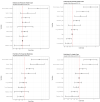Population Perspectives on Impact of the COVID-19 Pandemic on Essential Health Services-Behavioral Insights from the Federation of Bosnia and Herzegovina
- PMID: 36546978
- PMCID: PMC9774738
- DOI: 10.3390/bs12120495
Population Perspectives on Impact of the COVID-19 Pandemic on Essential Health Services-Behavioral Insights from the Federation of Bosnia and Herzegovina
Abstract
The aim of this study was to analyze the impact of the COVID-19 pandemic on patterns of use of essential health services (EHS), health-seeking behaviors, and population health and wellbeing in the Federation of Bosnia and Herzegovina (FBiH) from the perspective of its adult population. A population-based survey was implemented in the FBiH in December 2020 on a sample of 1068 adults. Overall, 64% of respondents received care, significantly more being women (67% vs. 61%, p = 0.046), those with a chronic disease (CD) (75% vs. 65%, p < 0.001), and of an older age (58% in 18−34 vs. 67% in older, p = 0.031). These groups also postponed care more often (39% in 55+ vs. 31% in 18−34 years old, p = 0.01; 55% with CD vs. 31% without, p < 0.001; and 43% in females vs. 32% males, p < 0.001). Main reasons for postponing care were lack of available appointments and fear of infection. The presence of a CD was the strongest predictor of need, access, and disruptions of health care. Respondents reported increased expenses for medicines (40%) and health services (30%). The findings of the survey add user insights into EHS disruptions to existing health statistics and other data and may be used to inform strategies for mitigating the impact of COVID-19 on the disruption of health care services, strengthening health system preparedness and building resilience for future emergencies.
Keywords: COVID-19; access to health care services; essential health services; health systems preparedness and resilience.
Conflict of interest statement
There are no conflicts of interest.
Figures


Similar articles
-
Satisfaction with Health Care Services in the Adult Population of the Federation of Bosnia and Herzegovina during the COVID-19 Pandemic.Medicina (Kaunas). 2022 Dec 31;59(1):97. doi: 10.3390/medicina59010097. Medicina (Kaunas). 2022. PMID: 36676723 Free PMC article.
-
Diabetology Care During COVID-19 Lockdown in Bosnia and Herzegovina - Diabetologists and Patients Perspective.Mater Sociomed. 2020 Sep;32(3):183-186. doi: 10.5455/msm.2020.32.183-186. Mater Sociomed. 2020. PMID: 33424446 Free PMC article.
-
COVID-19 in the Federation of Bosnia and Herzegovina: Strengthening the public health surveillance using a web-based system to inform public health response, March 2020 - March 2022.Biomol Biomed. 2023 Jul 3;23(4):718-725. doi: 10.17305/bb.2022.8050. Biomol Biomed. 2023. PMID: 36803546 Free PMC article.
-
Impact of the COVID-19 pandemic on access to and utilisation of services for sexual and reproductive health: a scoping review.BMJ Glob Health. 2022 Oct;7(10):e009594. doi: 10.1136/bmjgh-2022-009594. BMJ Glob Health. 2022. PMID: 36202429 Free PMC article.
-
Bosnia and herzegovina healthcare system preparedness for pandemic influenza as of 2010.Mater Sociomed. 2013 Dec;25(4):246-9. doi: 10.5455/msm.2013.25.246-249. Epub 2013 Nov 24. Mater Sociomed. 2013. PMID: 24511267 Free PMC article. Review.
Cited by
-
The impact of the COVID-19 pandemic on the health and working conditions of nurses and its implications for policies: a cross-sectional study in Slovakia.BMC Nurs. 2023 May 29;22(1):185. doi: 10.1186/s12912-023-01356-z. BMC Nurs. 2023. PMID: 37248500 Free PMC article.
-
Excess All-Cause Mortality by Age and Gender During the COVID-19 Pandemic in the Federation of Bosnia and Herzegovina, Bosnia and Herzegovina: 2020-2022.Influenza Other Respir Viruses. 2025 Mar;19(3):e70086. doi: 10.1111/irv.70086. Influenza Other Respir Viruses. 2025. PMID: 40010310 Free PMC article.
References
-
- WHO WHO Coronavirus (COVID-19) Dashboard. [(accessed on 10 December 2021)]. Available online: https://covid19.who.int/
-
- WHO Second Round of the National Pulse Survey on Continuity of Essential Health Services during the COVID-19 Pandemic. 2021. [(accessed on 10 December 2021)]. Available online: https://www.who.int/publications/i/item/WHO-2019-nCoV-EHS-continuity-sur....
-
- Kontis V., Bennett J.E., Rashid T., Parks R.M., Pearson-Stuttard J., Guillot M., Asaria P., Zhou B., Battaglini M., Corsetti G., et al. Magnitude, demographics and dynamics of the effect of the first wave of the COVID-19 pandemic on all-cause mortality in 21 industrialized countries. Nat. Med. 2020;26:1919–1928. doi: 10.1038/s41591-020-1112-0. - DOI - PMC - PubMed
Grants and funding
LinkOut - more resources
Full Text Sources

